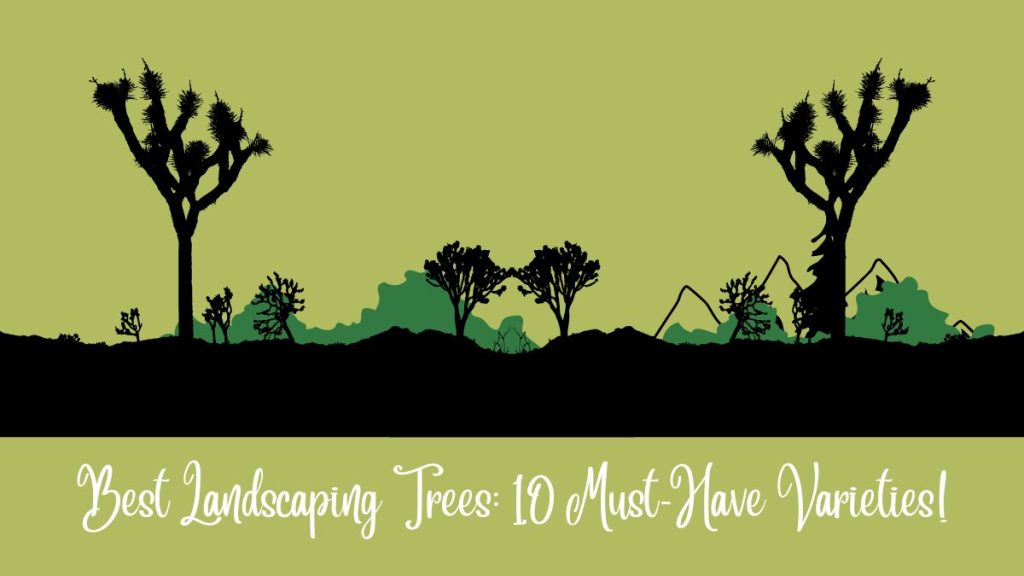Best landscaping trees include the Japanese Maple and the Dogwood Tree. They add beauty and enhance the curb appeal of your yard.
Landscaping trees play a crucial role in creating an attractive outdoor space. The right trees can provide shade, enhance privacy, and add seasonal interest with flowers, foliage, and fruit. Japanese Maple trees are known for their vibrant colors and elegant form, making them a popular choice.
Dogwood trees offer beautiful spring blossoms and striking fall foliage. Consider factors like tree size, growth rate, and maintenance needs when selecting trees for your landscape. Choosing the best trees can transform your yard into a picturesque retreat, offering both aesthetic and functional benefits.
Related Article: Simple Landscape Design Ideas: Transform Your Yard Now!

Related Article: Benefits of Landscape Architecture: Enhance Your Space!
Selecting The Right Trees For Your Landscape
Choosing the best trees for your landscape can transform your outdoor space. The right trees add beauty, shade, and value to your home. This section will guide you on selecting the ideal trees for your landscape. Focus on climate, soil, and tree preferences to make the best choice.
Climate Considerations
Climate plays a crucial role in tree selection. Different trees thrive in different climates. For example, palm trees grow well in tropical areas. Maple trees prefer cooler climates.
Here is a simple list to consider:
- Check your region’s hardiness zone.
- Select trees suitable for your zone.
- Consider seasonal changes and tree tolerance.
Understanding your climate helps in choosing trees that will flourish. Consider temperature, rainfall, and seasonal variations. This ensures your trees stay healthy and beautiful.
Soil Types And Tree Preferences
Soil type is another key factor. Different trees have different soil needs. Some trees prefer sandy soil, while others thrive in clay. Knowing your soil type helps in selecting suitable trees.
Here is a table to help you understand tree-soil preferences:
| Soil Type | Suitable Trees |
|---|---|
| Sandy Soil | Pine, Oak |
| Clay Soil | Maple, Birch |
| Loamy Soil | Apple, Cherry |
Test your soil before planting trees. Soil testing kits are available online and in stores. This helps in making an informed decision.
Choose trees that match your soil type. This ensures strong growth and long-term health.
In summary, consider climate and soil when selecting trees. The right choice will enhance your landscape and bring joy for years.
Deciduous Trees For Seasonal Beauty
Deciduous trees offer a unique charm throughout the year. They change with the seasons, providing beauty and variety to your landscape. Their leaves turn vibrant colors in fall and bloom in spring, creating a stunning display.
Maple Varieties For Stunning Fall Foliage
Maple trees are known for their brilliant fall colors. They can transform any yard with their fiery red, orange, and yellow leaves. Here are some popular maple varieties:
- Sugar Maple: Known for its sweet sap, it turns bright orange and red in fall.
- Red Maple: This tree has red flowers in spring and deep red leaves in fall.
- Japanese Maple: Smaller and perfect for gardens, it has delicate, lacy leaves that turn vibrant red.
Flowering Dogwoods: Spring’s Bloomers
Flowering dogwoods are a favorite for their springtime blooms. They add a splash of color to your garden and attract butterflies. Here are some popular dogwood varieties:
| Variety | Bloom Color | Special Feature |
|---|---|---|
| White Dogwood | White | Classic beauty with white blooms |
| Pink Dogwood | Pink | Delicate pink flowers in spring |
| Kousa Dogwood | White | Later blooms with striking red berries |
Related Article: Modern Landscaping Designs: Transform Your Outdoor Space Today
Evergreen Trees For Year-round Coverage
Evergreen trees are perfect for keeping your garden green all year. They stay lush and beautiful, even in winter. These trees provide privacy and shelter. They also add beauty to any landscape.
Pine Trees: A Classic Choice
Pine trees are a popular choice for many gardeners. They are easy to grow and maintain. Pine trees have needles that stay green all year. This makes them perfect for any season. They also grow tall and provide good shade.
| Type | Height | Growth Rate |
|---|---|---|
| White Pine | 50-80 feet | Fast |
| Scotch Pine | 30-60 feet | Medium |
| Ponderosa Pine | 60-125 feet | Slow |
- Easy to grow
- Provides good shade
- Stays green all year
Cedar Trees For Privacy Hedges
Cedar trees are great for privacy hedges. They grow thick and tall. This makes them perfect for blocking views. Cedar trees are also very hardy. They can withstand different weather conditions. This makes them a reliable choice for any garden.
- Thick and tall growth
- Great for blocking views
- Hardy and weather-resistant
Both pine and cedar trees offer unique benefits. Choose the right one for your landscape needs. Enjoy a green and beautiful garden all year.
Fruit-bearing Trees For Gardens
Fruit-bearing trees add beauty and value to gardens. They offer fresh produce and shade. These trees attract birds and pollinators. Let’s explore some of the best options.
Citrus Trees: Multipurpose And Fragrant
Citrus trees are a great choice for any garden. They produce oranges, lemons, and limes. Their flowers have a lovely fragrance. Citrus trees are easy to grow in warm climates. They need full sun and well-drained soil.
| Citrus Type | Best Climate | Care Tips |
|---|---|---|
| Orange | Warm, sunny | Water regularly, fertilize yearly |
| Lemon | Hot, sunny | Prune to shape, mulch base |
| Lime | Warm, humid | Avoid waterlogging, protect from frost |
Apple Trees For Homegrown Produce
Apple trees are perfect for home gardens. They provide delicious fruit every year. Apple trees can grow in various climates. They do best in cooler regions.
- Choose the right variety for your zone
- Plant in well-drained soil
- Ensure they get full sun
Apple trees need regular pruning. This helps them stay healthy and produce more fruit. Water the trees deeply but not too often.
Look for disease-resistant varieties. This will save you trouble in the long run. Apple trees attract bees and other pollinators. This benefits your entire garden.
Related Article: Types of Landscaping Garden: Transform Your Outdoor Space
Shade Trees To Cool Your Yard
Shade trees provide a cool retreat during summer. They reduce energy costs and add beauty to your yard. Choose the right tree to create a comfortable and inviting space.
Majestic Oaks For Spacious Areas
Oaks are perfect for large yards. They grow tall and spread wide. They offer dense shade, ideal for picnics and play areas. Oaks are strong and live long, often over 100 years. Popular oak varieties include:
- White Oak
- Red Oak
- Pin Oak
Plant oaks where they have room to grow. They need full sun and well-drained soil. Regular watering helps them thrive, especially when young. Mulch around the base to keep roots cool and moist.
Elm Trees: A Canopy Of Comfort
Elm trees create a cozy canopy. They have arching branches that form a rounded shape. Elm trees grow fast and provide ample shade. They are perfect for smaller yards or lining streets.
Some popular elm varieties include:
- American Elm
- Chinese Elm
- Siberian Elm
Elms prefer moist, well-drained soil. They tolerate different soil types and conditions. Water them regularly, especially during dry periods. Prune to maintain their shape and remove dead branches.
Comparison Table: Oak Vs. Elm
| Feature | Oak | Elm |
|---|---|---|
| Growth Rate | Slow | Fast |
| Shape | Wide and Spreading | Rounded Canopy |
| Shade Density | Dense | Moderate |
| Soil Preference | Well-drained | Moist, well-drained |
Related Article: How to Landscape around Trees: Beautify Your Yard!

Related Article: Low Maintenance Landscaping Ideas for Front of House: Easy Tips
Ornamental Trees For Unique Landscapes
Ornamental trees add beauty to any landscape. They offer unique colors and shapes. These trees are perfect for creating focal points. Each tree has its own charm.
Japanese Maples: Artistic Focal Points
Japanese Maples are stunning trees. They have delicate leaves and bright colors. These trees can turn red, orange, or yellow in autumn. They grow well in small spaces. Japanese Maples fit well in any garden.
- Height: 10-25 feet
- Spread: 10-25 feet
- Light: Partial shade to full sun
- Soil: Well-drained soil
- USDA Zones: 5-8
Japanese Maples are easy to care for. They need regular watering. Mulching helps keep the soil moist. Pruning helps shape the tree. These trees grow slowly but live long.
Weeping Willows: Graceful Elegance
Weeping Willows are known for their long, drooping branches. They create a graceful look. These trees grow fast and large. Weeping Willows need plenty of space.
- Height: 30-50 feet
- Spread: 30-50 feet
- Light: Full sun to partial shade
- Soil: Moist, well-drained soil
- USDA Zones: 4-9
Weeping Willows thrive near water. They are perfect for pond edges. These trees provide great shade. Regular pruning keeps them healthy. Weeping Willows can live for many years.
10 Most Popular Ornamental Trees for Your Garden>>
Related article: How Much Does It Cost to Landscape a Backyard: Budget Guide
Conclusion
Choosing the right landscaping trees can transform your outdoor space. Select trees that suit your climate and soil. Consider the tree’s height, spread, and maintenance needs. With proper care, your landscape will thrive. Enjoy the beauty and benefits of well-chosen trees in your garden.
Related Article: How Can Landscape Architecture Serve the World Today
You may also read: Best Landscape Architecture Books to Transform Your Design Perspective

Pingback: Benefits of Landscape Architecture: Enhance Your Space! - SpaceArc
Pingback: How Can Landscape Architecture Serve the World Today - SpaceArc
Pingback: Simple Landscape Design Ideas: Transform Your Yard Now! - SpaceArc
Pingback: How to Landscape around Trees: Beautify Your Yard! - SpaceArc
Pingback: Low Maintenance Landscaping Ideas for Front of House: Easy Tips - SpaceArc
Pingback: How Much Does It Cost to Landscape a Backyard: Budget Guide - SpaceArc